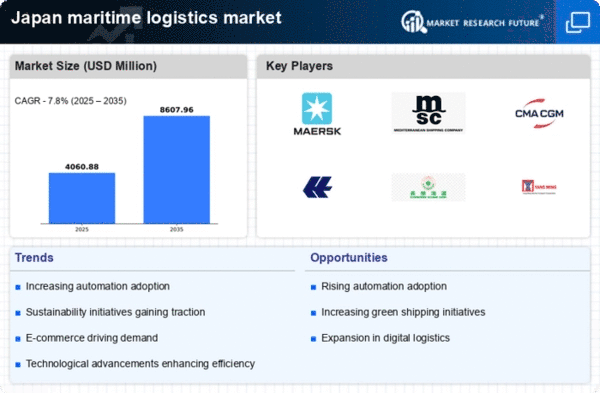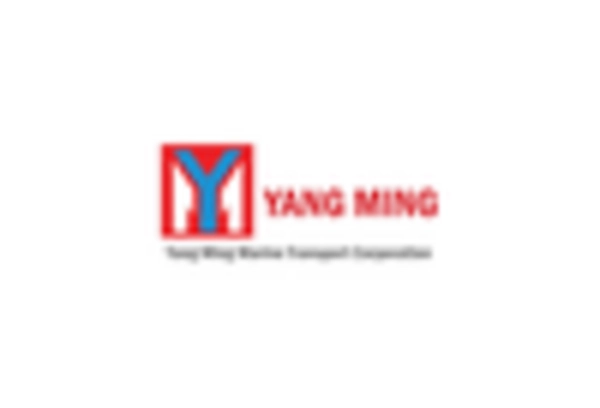Regulatory Compliance
Japan's stringent regulatory framework significantly influences the maritime logistics-services market. Compliance with international maritime regulations, such as the International Maritime Organization's (IMO) standards, necessitates that companies invest in advanced technologies and training. The implementation of the Marine Pollution Prevention Act requires shipping companies to adopt eco-friendly practices, which may incur additional costs but ultimately leads to a more sustainable industry. In 2025, it is estimated that compliance-related expenditures could account for up to 15% of operational budgets for logistics firms. This regulatory landscape compels companies to innovate and adapt, thereby shaping the competitive dynamics within the maritime logistics-services market.
Digital Transformation
The shift towards digitalization is reshaping the maritime logistics-services market in Japan. Companies are increasingly adopting technologies such as blockchain, IoT, and AI to enhance supply chain transparency and efficiency. For example, the integration of IoT devices in shipping containers allows for real-time tracking of cargo, which can reduce delays and improve customer satisfaction. In 2025, it is projected that digital solutions could streamline operations, potentially reducing logistics costs by 20%. This transformation not only optimizes resource allocation but also fosters collaboration among stakeholders, thereby driving growth in the maritime logistics-services market.
Increased Trade Activities
Japan's strategic position as a trade hub in Asia contributes to the expansion of the maritime logistics-services market. The country has established numerous free trade agreements, which facilitate smoother trade flows with key partners. In 2025, Japan's exports are expected to reach $700 billion, further stimulating demand for efficient logistics services. This increase in trade activities necessitates robust maritime logistics solutions to handle the growing volume of goods. Consequently, logistics providers are likely to enhance their service offerings, including warehousing and distribution, to cater to the evolving needs of businesses engaged in international trade.
Infrastructure Development
The ongoing enhancement of port infrastructure in Japan plays a pivotal role in the maritime logistics-services market. Investments in modernizing facilities, such as the construction of new terminals and the expansion of existing ones, are expected to improve operational efficiency. For instance, the Japanese government allocated approximately $2 billion for port upgrades in 2025, which is likely to facilitate increased cargo handling capacity. This development not only supports larger vessels but also enhances connectivity with inland transportation networks. As a result, the maritime logistics-services market is poised for growth, with improved turnaround times and reduced operational costs, thereby attracting more shipping lines and logistics providers.
Environmental Sustainability Initiatives
The maritime logistics-services market in Japan is increasingly influenced by environmental sustainability initiatives. The government has set ambitious targets to reduce greenhouse gas emissions from the shipping sector by 30% by 2030. This commitment drives companies to adopt cleaner technologies and practices, such as using alternative fuels and optimizing routes to minimize fuel consumption. In 2025, it is anticipated that investments in sustainable practices could account for up to 10% of total operational costs for logistics firms. As a result, the maritime logistics-services market is likely to witness a shift towards greener solutions, aligning with global sustainability trends.

















